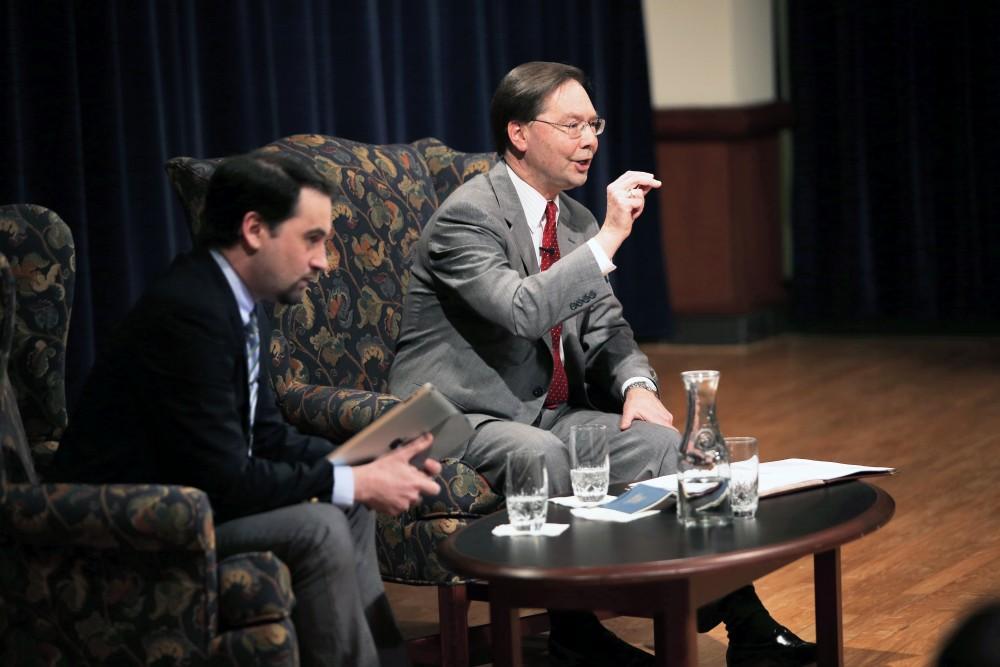Experts debate on effects of court case

GVL/Kevin Sielaff Ian Millhiser (left) and Hans Von Spakovsky (right)
Feb 5, 2015
On Feb. 3, Grand Valley State University organized a debate between Ian Millhiser from the Center for American Progress and Hans von Spakovsky from the Heritage Foundation. As part of the Coffee House Debate series, the Hauenstein Center for Presidential Studies asked the speakers to debate the question “Is ‘Citizens United’ good for American democracy?”
Von Spakovsky asserted that the court case “Citizens United” is good for American democracy.
“The first amendment is very clear and simple,” he said. “Congress will make no law abridging the freedom of speech. The amendment does not add of certain individuals; it pertains to all. It was a good decision, and restored a vital part of the First Amendment that had been restricted by Congress.”
Millhiser disagreed.
“This court case encourages rampant corruption in the legislature,” he said. “There have been examples where quid pro quo corruption has taken place as a result of money being made available to political candidates.”
Millhiser explained that there were democratic costs as a result of the outcome of “Citizens United.” He explained that the outcome means political candidates have to spend many hours a day fundraising in order to keep up with the competition.
“This means that for the politicians, there is more time dialing for dollars, less time spent learning what they are voting on, less time spent with constituents and less time working with colleagues,” Millhiser said.
The speakers, who both attended top 20 law schools, discussed the different implications that the landmark case had on American democracy.
“I’m frightened about the world we live in if our government is for sale to the highest bidder,” Millhiser.
However, Von Spakovsky had a varied opinion.
“Corruption will not occur as a result of this law; it will happen and have to be dealt with by the relevant authorities, but it is not related to this case,” von Spakovsky said.
The speakers additionally answered questions from the audience, including questions about donor disclosure and whether or not it was possible to have a political system that was not monetary centered. Millhiser and von Spakovsky announced that they had found common ground in the idea that the Bill of Rights applies to corporations as well as persons.
The debate ended with a final closing speech from each of the speakers, in which they reasserted their opinion but explained in what ways they had found common ground.
“It was very interesting, very enlightening,” student Lawrence Williams said. “It was something that each and every student at GVSU, especially those who are interested in politics, should have come to hear.”
Joseph Hogan, program manager of the Common Ground Initiative at the Hauenstein Center, explained that a current issue on campus is the nature and purpose of free speech.
“’Citizens United,’ the Supreme Court Case on which this debate focuses, effectively grants free speech rights to nonprofit corporations,” Hogan said. “Some Americans applaud the decision as upholding free speech; others argue that it effectively drowns out the voices of average Americans.”
Both sides have strong points, and Hauenstein Center employees believe that is necessary for students, faculty and community members to have the opportunity to hear from both of those sides, Hogan said.
Millhiser and von Spakovsky are both recognized as leading voices on the topic of “Citizens United,” Hogan explained.
“They have very different opinions about the decision,” he said. “Hans supports it; Ian criticizes it. They’re both fierce debaters but can argue with civility.”
Judge Hugh W. Brenneman, who introduced the two speakers as experts in their fields and vowed to remain nonpartisan throughout the discussion, explained the difference between a political contribution and a political expenditure for the audience.
“A contribution is limited under the law,” Brenneman explained. “It is money that the political candidate or committee is directly involved with. However, a political expenditure is one that is spent in a political venture, but is not coordinated with the candidate.”
Video recording of the event will be available on the Hauenstein Center website at www.hauensteincenter.org/.























